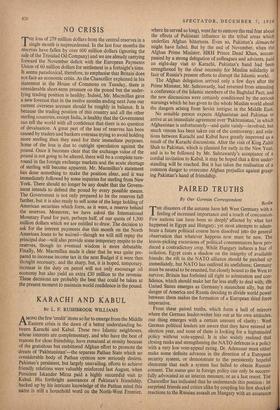NO CRISIS
Tto i loss of 279 million dollars from the central reserves in a single month is unprecedented. In the last four months the reserves have fallen by over 600 million dollars (ignoring the sale of the Trinidad Oil Company) and we are already carrying forward the November deficit with the European Payments Union of 60 million dollars for settlement in a fortnight's time. It seems paradoxical, therefore, to emphasise that Britain does not face an economic crisis. As the Chancellor explained in his statement in the House of Commons on Tuesday, there is considerable short-term pressure on the pound but the under- lying trading position is healthy. Indeed, Mr. Macmillan gave a new forecast that in the twelve months ending next June our current overseas account should be roughly in balance. It is because the trading position of this country and all the other sterling countries, except India, is healthy that the Government can tell the world with all confidence that there is no question of devaluation. A great part of the loss of reserves has been caused by traders and bankers overseas trying to avoid holding more sterling than they need for their immediate purposes. Some of the loss is due to outright speculation against the pound. Once it becomes clear that the exchange value of the pound is not going to be altered, there will be a complete turn- round in the foreign exchange markets and the acute shortage of sterling will become apparent. Mr. Macmillan's statement has done something to make the position clear, and it was immediately followed by some inquiries for sterling from New York. There should no longer be any doubt that the Govern- ment intends to defend the pound by every possible means. The Government is not only prepared to let the reserves fall farther, but it is also ready to sell some of the large holding of American securities which form, as it were, a reserve behind the reserves. Moreover, we have asked the International Monetary Fund for part, perhaps half, of our quota of 1,300 million dollars which we are entitled to draw. The decision to ask for the interest payments due this month on the North American loans to be waived—though we will still repay the principal due—will also provide some temporary respite to the reserves, though its eventual wisdom is more debatable. Finally, Mr. Macmillan made it clear that he was quite pre- pared to increase income tax in the next Budget if it were then thought necessary, and the sharp, but, it is hoped, temporary. increase in the duty on petrol will not only encourage oil economy but also yield an extra £30 million to the revenue. These decisions are probably the best that could be taken at the present moment to maintain world confidence in the pound.


































 Previous page
Previous page